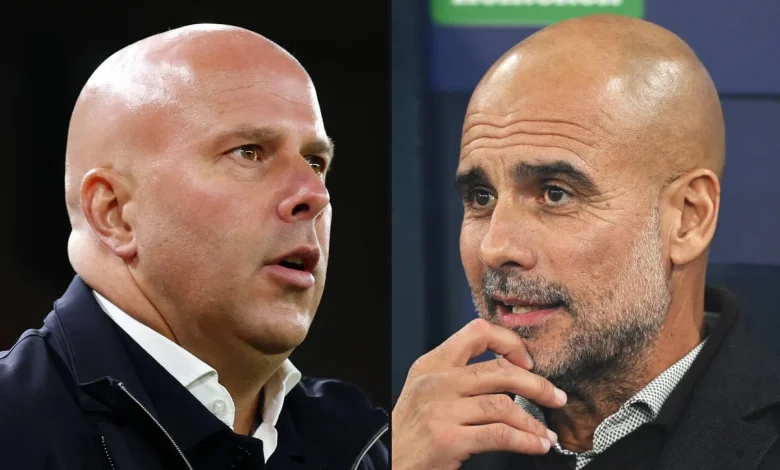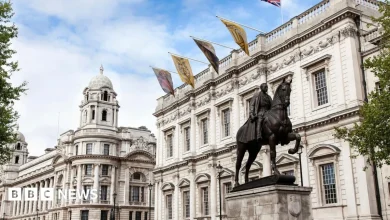Liverpool and Man City have little margin for error. Can either challenge Arsenal? – The Athletic

Sitting inside a raucous Anfield on Tuesday night, watching Liverpool’s players swarm all over Real Madrid, it felt as if they had rediscovered something. The thread of a season that had been unravelling was back under their control. A team that lost four Premier League games on the bounce was suddenly playing like champions again. Crisis? What crisis?
The same feeling arose 24 hours later as Manchester City swept Borussia Dortmund aside in the Champions League. Phil Foden seemed back to something like his beguiling best, Erling Haaland was doing what Erling Haaland does, and, perhaps for the first time in 12 months, Pep Guardiola’s team looked like they really mean business.
But it is not quite as straightforward as that. The issue is not just that Arsenal “look unstoppable right now”, as Guardiola put it. It is that City and Liverpool, with the stuttering starts they have made to this season, have left themselves with so little margin for error in the Premier League. They are already, respectively, six and seven points adrift of Arsenal. Those deficits will be extended to 10 and nine points if Arsenal win at Sunderland on Saturday evening and, while it is hard to predict the outcome of the City-Liverpool clash on Sunday afternoon, one thing is certain: they can’t both win.
Opta’s supercomputer, which uses an algorithm to predict outcomes based on 10,000 simulations of the season’s remaining games, puts Arsenal’s chances of a first Premier League title in 21 years at 71.5 per cent, with City ranked at 13.5 per cent and Liverpool at 9.7 per cent. (The remaining 5.3 per cent is split between 11 other teams, the highest of them Chelsea at 1.8 per cent.)
In other words, for all the positivity built up over the past week or so — wins for Liverpool over Aston Villa and Madrid, three straight wins for City, who have scored 10 goals in the process — one or other of them, or possibly both, could find themselves well adrift by Sunday evening, with Arsenal galloping into the middle distance.
Arsenal are six points clear at the top of the Premier League (Alex Livesey/Getty Images)
There is still, in some quarters, a tendency to belittle Arsenal, to imagine that gravity will ultimately catch up with them as it did when a young team fell away in the final weeks of the 2022-23 campaign. But that feels like a tired, outdated characterisation. It didn’t apply when they were overtaken by City a year later, given that they won 16 of their final 18 Premier League matches. Last season, when Mikel Arteta’s team finished a distant second to Liverpool, it was less a case of losing their nerve than of failing to generate enough momentum in the first place.
Guardiola, speaking to reporters before City’s 4-1 victory over Dortmund, sounded like a manager who takes Arsenal deadly seriously. “They look unstoppable right now because they play fantastic,” he said. “They don’t concede goals, they are so solid, and they can score from many different situations, different positions and many players.”
Of course, that phrase “right now” is relevant. Their run of 10 consecutive wins in all competitions (14 wins in 16 matches in all competitions, with only three goals conceded) has been enormously impressive, but their upcoming schedule looks tough, with the trip to Sunderland followed by clashes with Tottenham Hotspur, Bayern Munich and Chelsea in the space of eight days after this month’s international break.
But the questioning of Arsenal’s credentials feels a little like some of the appraisals of Liverpool this time last year. There was a view that they were slightly flattered by their early progress under Slot and that a tough run of fixtures between mid-October and early December — including Chelsea, Arsenal, Brighton & Hove Albion, Aston Villa, Manchester City and Newcastle United in the Premier League and RB Leipzig, Bayer Leverkusen and Real Madrid in the Champions League — would take the wind from their tails. By the time that run was over, they were seven points clear at the top of the table and flying high in the Champions League. Slot’s team barely looked back to see City and Arsenal stumbling.
Liverpool have not looked anything like so reliable so far this season. Even when they were winning their first five Premier League matches, the manner of those victories, all of them secured late on, attracted a degree of scepticism. That was the case even if the extent of their subsequent slump — four consecutive Premier League defeats, six losses out of seven in all competitions — surprised everybody.
That, too, had echoes of last season, when City, the reigning champions, lost their way completely after a promising start, winning just one match out of 13 in all competitions between late October and late December. Guardiola recalled on Wednesday night how, when that was happening, he shrugged off the first two defeats — “Ah, it’s only two games” — but then suddenly it was “three, four, five, six”. When that happens, he said, “the mountain is too difficult to climb”.
How many defeats is too many for teams with title-winning aspirations? There is no easy answer. In the 1990s and early 2000s, Sir Alex Ferguson used to calculate that his Manchester United could afford “no more than six” defeats, but that was in the days when league titles were frequently won with fewer than 80 points. The performances of Arsenal in 2003-04 (90 points, no defeats) and Chelsea in 2004-05 (95 points, one defeat) and 2005-06 (91 points, five defeats) forced a serious reappraisal.
Guardiola’s City team raised the bar even further, winning the title with 100 points (two defeats) in 2017-18 and 98 points (four defeats) a year later. In that 2018-19 campaign, Liverpool won 97 points (only one defeat) — a total surpassed just three times in the Premier League era (twice by City, once by Liverpool) — and it was still not enough to get beyond City.
The title-winning standard has been lower in recent years; City won it with 86, 93, 89 and 91 points between 2020-21 and 2023-24 and Liverpool with 84 points last season, but some of those totals give a false impression. The three titles that were won with fewer than 90 points were wrapped up with at least three games still to play, which led to an easing off in the final weeks. Two of Liverpool’s four defeats last season came after they had secured the title with four games remaining.
Right now, Arsenal are on course for 95 points, City 72 and Liverpool (and indeed Sunderland and Bournemouth) 68. Those trajectories will fluctuate significantly as the season goes on, but even if Arsenal were to end up at, say, 89 or even 84 points (their totals as runners-up in 2023-24 and 2022-23 respectively), do City and Liverpool — this season’s City and this season’s Liverpool — have the consistency to get beyond those targets in a league in which, as Arne Slot keeps lamenting, opponents appear hellbent on making their lives difficult?
Since losing two of their first three Premier League games, City have lost just one of their 13 in all competitions. But it has still been stop-start by the standards of their long winning runs of their recent past. They have taken just seven points from their five away games in the Premier League, drawing at Arsenal (where they conceded a stoppage-time equaliser) and losing at Brighton and Aston Villa. Erling Haaland’s extraordinary goal output aside, the old certainties have been missing.
It is striking that Slot, after such an extensive (and expensive) summer revamp, has sought familiarity and stability in order to get Liverpool moving again. The wins over Villa and Madrid were achieved with Andy Robertson restored at left-back, at the expense of new signing Milos Kerkez, and with Dominik Szoboszlai bringing more balance and physical presence by reprising last season’s advanced-midfield role. Unrecognisable during that run of defeats, Slot’s team suddenly look far more like their old selves.
But do they have the momentum and belief to go and beat City at the Etihad Stadium, as they did so impressively last February to extend their lead at the top to what proved an unassailable 11 points? Do either they or City have what it takes to put together the type of long winning runs that have been the bedrock of their previous title successes?
So far this season, there have been too many unknowns in both camps. Both have spent heavily in the transfer market this year — City around £180million in January and a further £220m in the summer, Liverpool just short of £450m this summer — but very few of the incoming players have hit the ground running.
Liverpool beat Villa and Madrid with Robertson restored to the side (Carl Recine/Getty Images)
It will be interesting to see just how many of the new signings start on Sunday: Gianluigi Donnarumma and perhaps a couple of others (Nico Gonzalez, plus either Tijjani Reijnders or Rayan Cherki) for City; Giorgi Mamardashvili (deputising for the injured Alisson), Hugo Ekitike and perhaps Florian Wirtz for Liverpool. As much as possible, both managers will put their faith in the tried and trusted.
What both Guardiola and Slot need is somehow to find the consistency of their title-winning campaigns while their squads are in a period of change. The money both clubs have spent brings a demand and an expectation for trophy successes, but, as Liverpool demonstrated last season, there is a strength to be drawn from stability. For all the talk of “winning the transfer window”, as Liverpool were perceived by many to have done this summer, integrating four or five new signings at once is usually far easier said than done.
So far this term, it is Arsenal who have shown the solidity, reliability and unswerving focus that title-winning teams need. They, too, spent heavily in the summer, but they were able to build on their established strengths rather than overhaul several areas of their team at once. Liverpool and particularly City have benefited from stability in the recent past. Right now, it is Arsenal who look the most assured.
Should the leaders falter over the months ahead, Slot and Guardiola will hope their teams are in a position to capitalise. But already Liverpool’s and City’s margin for error is far smaller than they would have imagined by this stage of the campaign. By Sunday evening, for one or perhaps even both of them, it threatens to be smaller still.




